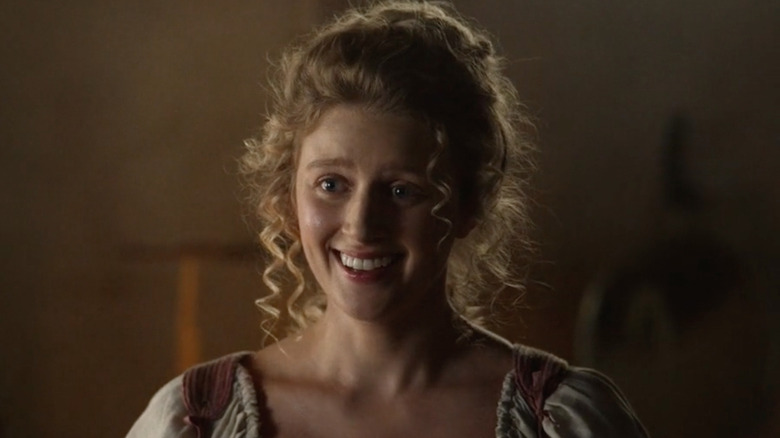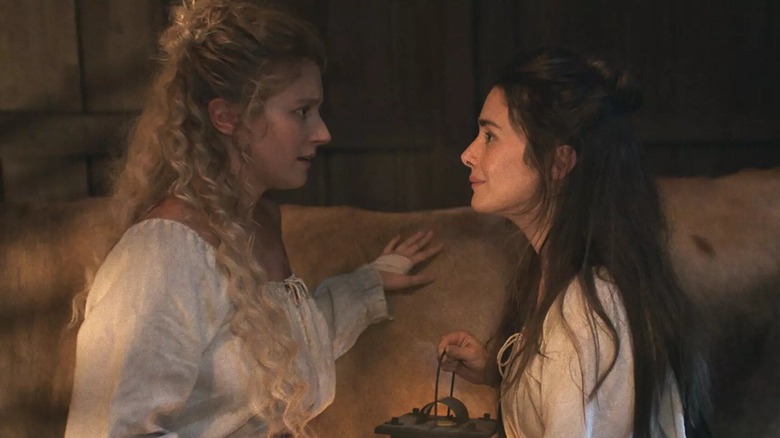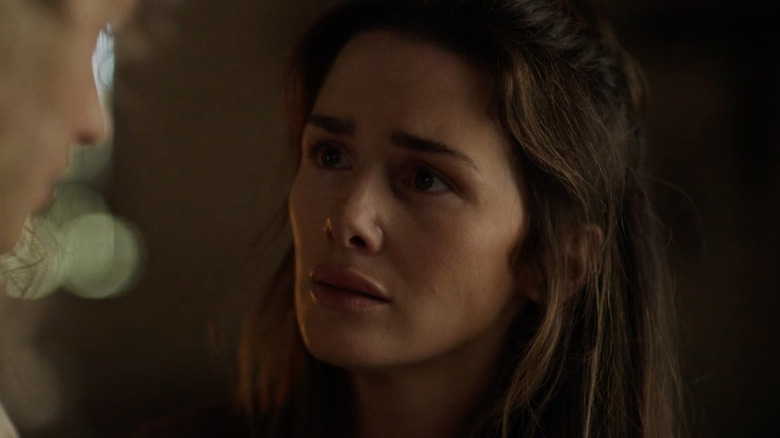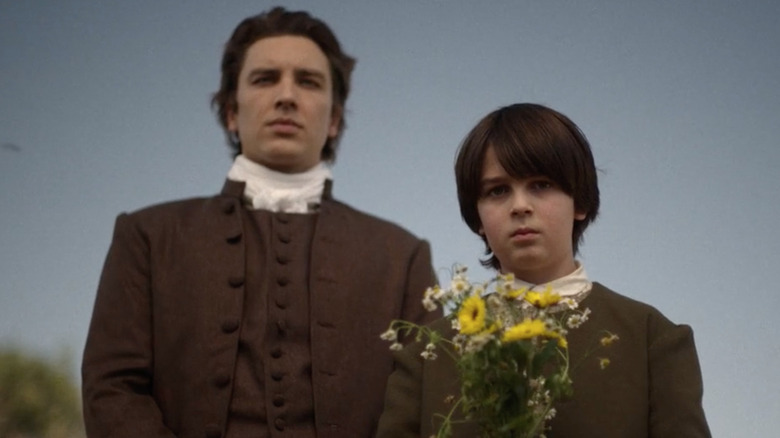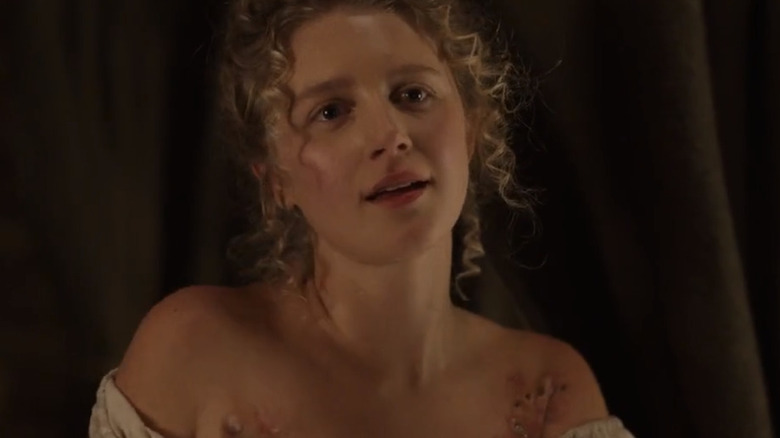American Horror Stories Fans Agree Milkmaids' Plot Was Unbelievable
There have been two seasons of "American Horror Stories" so far, and some of the more memorable episodes are direct callbacks to the main series. Season 1, for example, opened up with a two-parter that saw a new family move into the Murder House. In Season 2, Episode 1, "Dollhouse," fans looked inside the backstory of Spalding, the butler from "Coven" who ultimately became one of the antagonists.
Some episodes, however, are entirely out of the left field. While every season and episode of the two shows take place in the same universe, many of the stories feel isolated or unrelated to one another. There were few episodes more polarizing than Season 2, Episode 4, "Milkmaids." This episode took the cast back in time to a 1700s settlement riddled with smallpox and no real understanding of what the disease was.
While "Milkmaids" played with some interesting ideas about how immunity to disease works and how hyper-religious people would sooner believe in sadistic rituals than science, most fans agreed that this episode didn't make much sense. The episode might have had potential, had it not gone for some unrealistic elements that ruined fans' ability to suspend their disbelief.
One fan said Milkmaids was the worst episode ever
After the premiere of "Milkmaids," fans took to Reddit to discuss their feelings. Redditor u/inthearchipelago posted a discussion about the episode, explaining,, "Of any episode of American Horror Story, American Horror Stories, any Ryan Murphy production (including the entirety of Glee), any episode of American television, any episode of horror television, in every single way, from the acting to the editing to the camera work to the music, not one moment was redeemable, I wish not only that it had been even further delayed, but that Hulu had never dropped it, 0/10."
Apparently, there were no redeeming qualities about this episode according to the discussion's creator. Not only did they criticize the acting, but they also called out the production quality as a whole. Claiming that the entire episode was irredeemable felt a bit extreme, but their visceral reaction to "Milkmaids" got a conversation about the episode buzzing quickly.
Many fans agreed that the episode was horrible. U/atclubsilencio said, "This is how I felt. Really solid, if disgusting, first half, was expecting it go in a different direction, gave me 'Roanoke' vibes, and then completely nosedived."
"Roanoke," of course, refers to Season 6 of "American Horror Story," which might be one of the worst-received seasons of the series ever created. While the season started out strong by mimicking a docu-horror style TV show, when they returned to Roanoke, the entire plot plummeted into the ground.
Others claimed they couldn't suspend their disbelief
U/SteamedAnimations said, "Honestly I liked it a lot, but I must admit that the milkmaid talking about science broke my suspension of disbelief a bit."This seemed to be a common complaint amongst fans. Some of them believed that this ruined the episode, while others, like u/SteamedAnimations, still enjoyed the episode, even if they found the premise of a milkmaid knowing so much about science completely unrealistic.
"I kept waiting for them to reveal her as a time traveler or something. But nah she's just had access to all these texts and like....believed them?" u/TED-da-purple-blob commented. "I mean realistically, she at most would've had old versions of texts nothing new cos it takes MONTHS to get those books from other countries."
This brought up a few good points as to why the narrative felt completely unbelievable. The trope of an intelligent young woman pulling away from her religious settlement has become somewhat common for this time period — after all, many of these women would eventually be accused of witchcraft or condemned in some other way, like Sarah Fier in Netflix's "Fear Street" trilogy. However, having a single woman who works as a milkmaid be something of a genius in this area feels unrealistic for several reasons. One is, she shouldn't really have access to the texts that would teach her these things so accurately. Another is that even if she did, would she believe what she was reading with her upbringing?
The milkmaid did feel like she was a woman out of time or even otherworldly, in a way. Having that sort of reveal might have made more sense for the narrative.
Some criticism focused on reoccurring issues with American Horror Story
While many comments on the thread agreed that "Milkmaids" was a horrible episode because of how unbelievable it was, a few users took it as an opportunity to talk about the reoccurring issues. Some focused on the lack of consistency, where the first half of the story is compelling and engaging, only for the franchise to drop the ball in the second half.
U/cutie__96 wanted to talk about a specific dislike, though, which is how "American Horror Story" always includes deaths for the sake of shock value. "Tbh, I liked it up until the ending. 'AHS' has a history of killing characters for sh*ts and giggles and Celeste's death was by far one of the most unnecessary and stupidest," u/cutie__96 elaborated on their thoughts. "Like was the psycho child only created so Celeste could die in the end? Cause it felt like it. He didn't offer much to the story other than that."
This brings up a fair point that "American Horror Story" has a reputation for killing off characters for no reason. Because the franchise is so heavily dripped in horror, they can often get away with decisions that are 100% for shock value, and the "Milkmaids" episode highlighted many ongoing issues the franchise has. Whether the episode was good or not is irrelevant in this regard, because it proves that the franchise continues to struggle with the same issues fans call out constantly.
Milkmaids was based on the true story of the smallpox vaccine... sort of
While "Milkmaids" ended up dividing fans due to its content and its frankly repulsive nature of showing people graphically ingesting puss from open wounds, the inspiration behind the episode was based on some resemblance of truth. This shouldn't come as a shock, because that's the bread and butter of "American Horror Stories" and its parent show. Take an idea or a person or an instance in time that actually existed and twist it into fiction for the story.
In this case, the Milkmaid Story is a common explanation for how Edward Jenner eventually created the smallpox vaccine.According to the story, as a boy, Jenner overheard a milkmaid claim that she couldn't contract smallpox because she had cowpox. This stayed with the boy throughout most of his life until, eventually, he created a vaccine based on cowpox. The Milkmaid Story sort of reads as a fairy tale more than fact. Jenner was documented as the first person to ever utilize a vaccine to attempt to control an infectious disease.
The Milkmaids Story might read more as a fable than fact and some professionals, like Dr. Arthur Boylston, a recognizable name at Oxford University, have called its legitimacy into question. Regardless, the inspiration for "Milkmaids" came from this story. Rather than a young boy who would go on to become a doctor developing the cure, though, they allowed that role to be filled by Delilah, the milkmaid looking after Celeste, the woman immune to smallpox.
